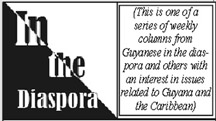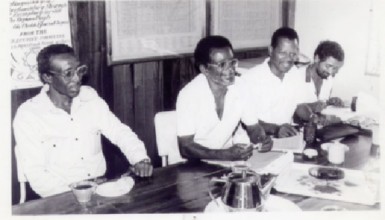By Nigel Westmaas
Nigel Westmaas teaches at Hamilton College
 Any attempt to analyze or summarize the vast repertoire of Clive Thomas’s work in a single article is a daunting task. For over five decades the academic and political contributions of Thomas, who retired from the University of Guyana at the end of 2014, have helped shape intellectual and economic thinking in the Caribbean and beyond. More specifically, as economist, trade unionist, and politician, Thomas has contributed immensely to the political and social landscape of his native Guyana.
Any attempt to analyze or summarize the vast repertoire of Clive Thomas’s work in a single article is a daunting task. For over five decades the academic and political contributions of Thomas, who retired from the University of Guyana at the end of 2014, have helped shape intellectual and economic thinking in the Caribbean and beyond. More specifically, as economist, trade unionist, and politician, Thomas has contributed immensely to the political and social landscape of his native Guyana.
The contours and impact of Thomas’s overall work; his contribution to regional thinking not only in “third world” economics but the global economy and its operations; and his forthright support of the working class and the poor and the powerless in Guyana and the region are enormous. His work has covered the plantation complex in the region; dependence and transformation; the emergence of the authoritarian state; the non-capitalist path to development; and his studies and proposals to diversify the sugar cane product to include ethanol. In more recent times the economic tracking of the narco state, money laundering, the phantom economy, central bank operations, and criminalization of the Guyana state are among the topics that Thomas has engaged and debated at the highest level of expertise and discernment.

Yet, amidst all his intellectual prowess and political insight he has been flexible and courageous enough to change his mind, and to offer fresh analyses while adopting a consistent stand on issues like democracy in principled defiance of the rigid axioms and dogmatisms of sections of left thinking during the period of the Cold War. Denis Benn, Guyanese academic at the University of the West Indies acclaims Thomas’ prescient advocacy of democratic socialism, noting that Thomas sees “political democracy as [a] necessary contribution for establishment of a general socialist order.”
Economist
Rigorous, critical examination of society has been a pattern in Thomas’ intellectual and political contributions, from his early engagement with the regional New World (the pan Caribbean intellectual group of the 1960s) and global Marxist economic enquiry, to his current evisceration of predatory, drug infested money laundering capitalism and its outliers in the modern narco-state as in the case of his home country Guyana. The late Trinidadian Lloyd Best, one of the foremost brains behind New World offered the following assessment of Thomas’ relationship with the Caribbean grouping: “When he was in Guyana he was definitely into it, but I always say this in his favour, he always said when he was in it that he was not part of it, that he was a socialist, that he did not favour its (new world) ideological orientation.”
Thomas’ links with international Marxist currents of the new left disposition and association with leftist magazines like Monthly Review also set him apart from most Caribbean intellectuals of the 1960s.
One of the affirming texts in Thomas’s arrival as a regional and global intellectual was a collective
publication The Dynamics of West Indian Economic Integration (1967). With contributions by Havelock Brewster, Thomas, Allister McIntyre, George Beckford and E Armstrong, it became one of the landmark economic studies in the Caribbean. But while this study might have launched Thomas’ name it would never define or restrict his economic career or thematic concentration. What many consider his magnum opus, Dependence and Transformation: the Economics of Transition to Socialism, followed in 1974. These were followed by Plantation, Peasants and the State (1984), Rise of the Authoritarian State (1984) and Poor and the Powerless (1988).
Thomas’ strength lies in his rigorous and wide ranging examination of financial institutions, economic management and alternative development. He participated in groundbreaking research on the sugar industry and proposals for its long term survival. Concurrently he mentored, individually and collectively, legions of students, academics, politicians, unionists and workers. A number of third world governments similarly sought his expertise in various areas of their respective national economies.
He is recognized for his intense and prolific intellectual drive, firmly anchored by a commitment to centering the working peoples of the region. A main feature of his economic, social and political analysis (and with Thomas these concepts are interrelated) is his ability to use his intellectual clout to dissect local and global economic phenomena and bring with it the deep praxis to his always “current” analysis. This is why Thomas maintained a reputation as one of the least fossilized economists in the region.
Politics
Like Walter Rodney, Thomas had his spats with regional governments arising from his radical writings, his association with labour and his support for the downtrodden in the region. After the so called Rodney riots of 1968, Clive Thomas and Joey Jagan were banned from Jamaica (in 1969). After 1970, the Trinidadian Prime Minister Eric Williams refused to let Thomas come to work along with Bill Riveire and Pat Immanuel in the twin island Republic, a refusal that exemplified the state of fear over the threat that radical intellectuals posed to the status quo of newly independent Caribbean states.
But Thomas’ intellectual acuity made him a virtually indispensable figure, and his expertise was still sought despite his forthrightness on matters of social justice. At one point in the early 1970s the Guyanese Prime Minister Forbes Burnham asked Thomas to assist the government of the embattled left of centre Prime Minister Michael Manley of Jamaica in the country’s struggles with the IMF. As Thomas later explained,
“Manley was faced with a dilemma about what to do when the economic crisis began unfolding regarding his Central Bank and he asked Burnham, of all people, if he could facilitate getting me to Jamaica so he could have discussions and benefit from my advice…and Burnham actually called me and put me on a plane, a GDF plane, to take me to Jamaica. It was one of those propeller planes that took maybe a day to get there…” (Interview, 2012)
In 1971, the same year of the unsuccessful attempt on the life of the late Ratoon member and WPA activist Dr Joshua Ramsammy, there was a kidnap attempt on Dr Thomas. In June of that year a group of men arrived at his home and informed Thomas that Eusi Kwayana wanted to meet him in Plaisance. It was not true. The matter was headlined in Guyanese newspapers in October of the same year when Thomas held a press conference to elaborate and denounce the kidnap plot.
There were obvious reasons for Thomas to be seen as a threat to the state. He was a politically active critic of the Burnham government and instrumental in the formation of Ratoon and Movement against Oppression (MAO) in the late 1960s. Ratoon was one of the organizations that eventually coalesced to form the WPA.
A close friend and colleague of Walter Rodney, Thomas was instrumental in urging the late historian to return to Guyana in the early 1970s. As he explains in an interview published in 2012,
“I urged (Walter) him to come back to Guyana. He gave me a sort of understanding that he would consider that, and therefore I took the initiative when I returned to Guyana…took the initiative to move for him to be visiting professor at the University of Guyana. The position was approved by the appointments commission of the university to come to Guyana, and they issued a letter of appointment.” (Interview in Walter Rodney: A Promise of Revolution, 2012)
On his return to Guyana Rodney swiftly joined Thomas and other activists on the political front; one important activity is which they both engaged was volunteer classes with bauxite workers at Wismar Mackenzie.
Thomas authored and co-authored many of the WPA’s major documents including manifestos and the influential booklet Bread and Justice (1976), which became a template for the connection between economic and social and political justice in small countries like Guyana. Bread and Justice established a distinct line between the genuine humanist practice of working peoples’ movements using the socialist label and those that understood the left as representing organizational affinity with the international socialist bloc and consequent party control over the state. Thomas argued that the struggles for rights and for socialism in Guyana and the Caribbean must contain more freedom and not less, more and not less democracy. As he stated, “To socialists, bread and what can be more correctly termed the promise of bread, cannot be traded for freedom and social justice.”
Thomas, unlike Rodney or Kwayana, arguably appeared to prefer the corridors of discussion to the platform of stump politics. Nonetheless he was part of the shrewd, incisive thinker tradition, a public intellectual whose relatively discreet work on the margins and in the entrails of the body politic is not to be underestimated. His ability to negotiate across social class lines, to unreservedly embrace labour and the working people and social justice issues is largely untold. Thomas always enjoyed close relationships with trade unions, at both formal and informal levels. At one time or other he advised the major Guyanese trade unions including GAWU, CCWU, and GMWU and led negotiating teams with TUC and FITUG. He served as Chairman of the University of Guyana Workers Union (UGWU) and was active in support of staff and academics at the always frail institution of higher learning from the commencement of his job there.
Thomas was one of the group of black leaders in the WPA including Eusi Kwayana, Tacuma Ogunseye, David Hinds and others who suffered repression by the Burnham regime but came to feel deep alienation under the “democracy” of the PPP from 1992. At one level it was a simple matter. For Thomas who gave so much and participated so hard in the broad alliance(s) against the Burnham and Hoyte regimes, the ethnic sword was thrust straight into his heart. Later, there would be critics who would excoriate his “anti PPP” and pro black public statements and positions in the post 1992 period. In fact, Thomas, like others, reveals a consistency with his democratic, pro labour stand and in the post-1992 period he maintained this consistency of criticism as the new PPP regime began to violate all the moral and political norms of building an anti-dictatorial alliance and constitutional reform, reaching new heights of degeneration after the passing of Cheddi Jagan in 1997. A fierce anti-corruption crusader, Thomas’s recent work has offered a trenchant critique of the linkages between globalization, criminalization of the state and Guyana’s emerging narco-economy under the PPP/Civic administration.
More importantly, this world famous economist and intellectual rejected the lure of easy access to work in the world’s big universities, preferring to remain at home in Guyana and to devote his immense intellect to the Guyanese reality. Thomas continues to be active in the WPA along with his weekly column and his incisive intellectual contributions, which are widely shared and discussed in blog and discussion groups on and offline.
He remains at the cutting edge of social and economic analysis, criticism, and his activism and participation continue to be crucial for the survival of Guyana as a nation state.
